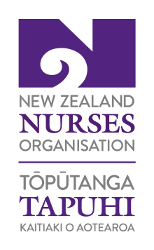 New Zealand Nurses Organisation media release, 22 January 2020
New Zealand Nurses Organisation media release, 22 January 2020
The New Zealand Nurses Organisation (NZNO) says a crisis is looming in the Primary Health Care Sector (general practices and accident and medical centres) if funding is not increased to allow practice and registered nurse salaries to match those of district health board (DHB) nurses.
NZNO has been negotiating the Primary Health Care Multi Collective Agreement (PHC MECA), which covers more than 3400 nurses, medical receptionists and administrators in more than 500 New Zealand general practices and accident and medical centres. But NZNO Industrial Advisor Chris Wilson says an acceptable offer for members has not been possible so far because of the funding shortfall.
Early in 2020 NZNO surveyed its members working in these workplaces and 70 percent of respondents said they were considering leaving the sector because of higher pay elsewhere – such as at services run by DHBs. Many nurse leaders who responded said they are struggling to recruit new nurses or keep the ones they already have.
Ms Wilson says a serious drop in practice and registered nurses is inevitable unless things change, and this will make health care much harder to access for people in Aotearoa New Zealand.
“Nurses at these workplaces provide services such as vaccinations, patient care programmes and triage at point of entry. They also give medical or health advice, which often reduces hospital admissions. Fewer nurses will mean these services become less available or more expensive, and this will have consequences for health and put extra demands on the health budget.”
Sector funding comes through the Vote Health Budget and is allocated to general practices and other services via the DHBs and primary health organisations (PHOs).
Ms Wilson says that while DHBs are paying their own nurses at the higher rates negotiated in the DHB/NZNO MECA, they are not passing on enough funding to ensure these primary health care nurses are paid the same. She says primary health nursing is just as complex as nursing in DHBs, yet it is being significantly undervalued by this obvious pay parity issue.
“As of May this year an experienced nurse covered by the PHC MECA will be paid 10 percent less than an experienced nurse in a DHB. That’s a huge difference and our survey respondents say this has significant impacts for their lives, including working extra shifts to make ends meet, foregoing holidays and family time, and not being able to afford a house.”
She said NZNO members are concerned about what this means for their communities and they want them to know of the impending issue. They will be asking funding decision makers to recognise the value of these primary health care nurses by addressing the salary issue. They are hopeful funders will acknowledge the value of this investment in community health when NZNO returns to bargaining next week.
“The Government and the DHBs need to understand that underfunding the Primary Health Care Sector is just robbing Peter to pay Paul. Not funding services that keep people well just costs everybody more in the long run, and increases suffering and inequities,” Ms Wilson said.
-Ends-
Media inquiries: Rob Zorn, NZNO Media and Communications Advisor: 027 431 2617.
Quotes from the survey (anonymised but used with permission)
There is an impending crisis in Primary Health unless funding is improved
“It means we are finding it increasingly more difficult to recruit and keep nurses in primary care.”
“I am tempted to leave PHC to be in a better remunerated job but then my passion is PHC … it’s very frustrating.”
“This is my community and I care about it.”
Underfunding sends the wrong message to a crucial health sector
“The message is clear: prevention /keeping people out of hospitals isn’t as important or valued as looking after them in hospital.”
“I feel undervalued and unseen.”
The community needs a well-funded Primary Health Care sector
“Our skill reduced the number of hospital admissions.”
“The health care and education we provide not only improves health outcomes for individuals, but also for communities.”
“We are the glue that holds the health system together. We connect many different services together.”
“We look after not just the individual – it extends to the whānau.”
“My direct nursing care has kept patients in their own homes rather than be admitted to hospital. Our continued hard work in times of disease outbreaks such as the Measles has a very direct impact on our communities.”
“We worked very hard through the recent measles epidemic ensuring all those that were vulnerable were vaccinated, that those who needed the vaccines the most were prioritised, and fielded hundreds of calls from concerned parents.”
“I know the work I do as a nurse in primary care everyday supports people to look after their health and their families so they can keep working and be active in our local community.”
“Community and Primary Health is essential in keeping people out of hospital and keeping well in the community. This in turn will save money in the long run. I work closely with type 2 diabetes and we work together to improve their overall health and to keep them well.”
The work is varied and complex
“I am an emergency nurse, educator, vaccinator, mental health nurse, paediatric nurse, palliative care nurse, surgical nurse, older persons nurse and much more each and every day for my community. I am the contact for the community and I am trusted and respected.”
“We are the advocates, the life jackets and the bridge builders for our patients. We are the rapport makers, the listeners and the understanders, the encouragers and the teachers. See us, respect us and value us.....or ultimately, you will lose us.”
“We see and manage patients that should or would have been in hospital earlier...”
“All up it ‘just doesn’t compute’ when there is a greater emphasis being put on keeping people well in their community.”